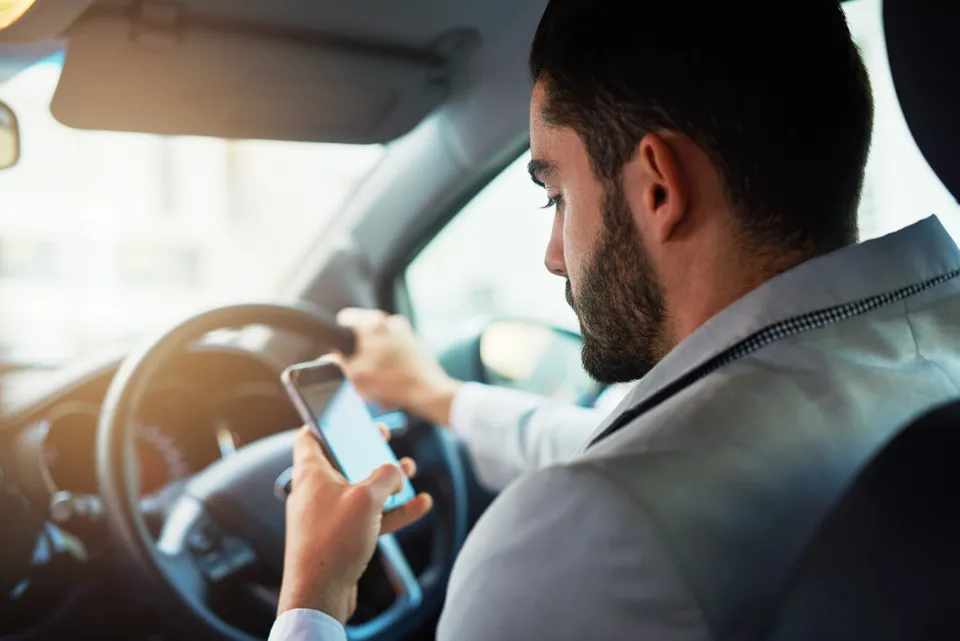Illegal mobile phone use is still rife, with 64% of motorists saying that in the last hour they spent driving they saw at least one driver committing the offence.
Of those, 6% claimed they saw between five and seven drivers breaking the law, whereas 36% witnessed one or two, according to a survey of more than 2,000 drivers carried out by the RAC.
Only 26% of motorists surveyed said they did not see anyone doing this, while 16% said on every journey they make they see others looking down as if they are interacting with their phones while stopped at traffic lights. The remaining 84% (of the 95%) who said they see this do so less frequently.
But, three in 10 motorists say they have used a handheld phone at the wheel; 29% claim they do it occasionally, while the other 1% show utter contempt for the current law, which came into force 13 years ago, saying they use their handheld phones on most journeys.
The main reason cited by 61% of respondents for occasional phone use at the wheel was to make a short call. Half (49%) of those admitting to using a handheld phone when driving said they had checked email or text messages, and a similar percentage (47%) had sent a text message.
While there is little difference in illegal phone use between male and female drivers; more men admit to using a handheld phone at the wheel than women (64% v 57%), whereas more women than men own up to sending a text (52% v 5%).
In age terms, almost a third of those surveyed (31%) say they see drivers of all ages committing the offence, but unsurprisingly the problem appears to be most prevalent in those under the age of 40, with 50% claiming they most frequently see drivers of this age group on their phones, either in a moving or stationary vehicle.
RAC spokesman Simon Williams said: “Thirteen years after the introduction of the current law forbidding use of a handheld phone at the wheel of a vehicle, this behaviour is far from being stamped out.
“In fact, the results of our research suggest the problem has got worse rather than better.
“The lack of a high profile advertising campaign similar to the ones targeting drink-drivers and speeders has not helped, nor has the decline in the number of roads police officers as there is very little fear among offenders of being caught.
“As a society we need to change drivers’ thinking to make them understand the serious consequences their decision to use their handheld phones can have. Using a handheld phone should be regarded as being as socially unacceptable as drinking and driving.
“There seems to be an unfortunate perception that a quick look at a phone at the traffic lights is okay. However, it is a significant distraction which at best may hold up other road users when a driver doesn’t notice that the lights have changed, and at worst may increase the risk of a collision with a pedestrian, cyclist or another vehicle.
“The Government is looking at increasing the penalties for using a handheld mobile phone at the wheel, and whilst this is welcome, there has to be a similar effort put in to enforcing these laws.
“Worryingly, the most recent data indicates that the number of fixed penalty notices issued has declined. And, with illegal phone use at epidemic levels now is the time for the Government to find the money for a high impact public awareness advertising campaign.”
The RAC research also shows the strength of feeling about those who use their handheld phone at the wheel, with 76% believing offenders are putting other people’s lives at risk and 60% saying they are ‘selfish and irresponsible’.
Half (50%) of the drivers seen using a handheld phone at the wheel fortunately did not have any passengers in the vehicle, and only 29% were noticed carrying passengers. The remaining 21% of motorists could not recall whether the offending driver did or did not have anyone else in the vehicle.
The current fine for using a handheld mobile phone when driving is three penalty points and a £100 fine. The Government has just carried out a consultation on raising the fine to £150 and increasing the penalty points for non-HGV drivers from three to four.





















Busterrabbit - 25/04/2016 11:30
We need more covert Police to catch drivers "multi-tasking" whilst driving. Cameras are useless for this. Just the other day on the M6 near Stoke where speeds vary constantly I was overtaken by a driver texting with his right hand and holding a cigarette with his left. I also passed a VW van driver who was dipping celery held in in his right hand into a pot of yoghurt held in his left hand and then eating it. This driving without due care and attention is rife and MUST be stopped. Motorway traffic can and does stop suddenly at any time and drivers need to concentrate 100% on driving.